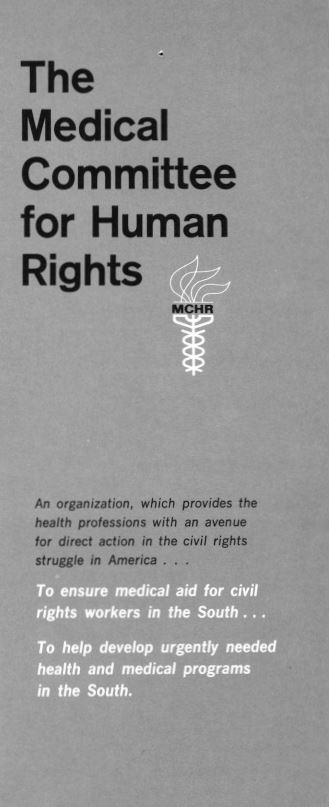On June 24, 1964, Dr. Tom Levin held a meeting of doctors at his home in New York City. The twelve doctors agreed to go to Mississippi to provide medical support for the thousand Freedom Summer volunteers who worked in Mississippi to register Black people to vote amidst racism and violence from local people who had disenfranchised Black voters. Additionally, volunteers set up community resources to aid the local Black population, including health centers, community centers, and schools. Adopting the name the Medical Committee for Human Rights (MCHR), the committee sent out a call for additional support. Roughly 100 medical volunteers ultimately supported Freedom Summer volunteers, and the goals of the MCHR were to administer first aid to civil rights workers and local Black people, help people get access to doctors and hospitals, and to help healthcare personnel working in the state.
MCHR coordinated fund-raising and recruitment for medical professionals in Mississippi, and by mid-July ran six health centers in Mississippi. Although Dr. Archie Gray, head of the Mississippi Department of Health, would not license any MCHR member to practice medicine in Mississippi, any citizen was allowed to give emergency first aid in Mississippi. Using this loophole, MCHR volunteers provided aid to Freedom Summer volunteers, conducted health-education classes, and aided impoverished Black communities, while under constant threat of violence, ambush, and arrest. After Freedom Summer, some volunteers left Mississippi while other remained to establish community health centers.
Harvard Medical School faculty involved with MCHR included Paul Dudley White and Alvin Poussaint.
To learn more about the Medical Committee for Human Rights, see John Dittmer’s The Good Doctors, the Student Nonviolent Coordinating Committee Legacy Project: https://snccdigital.org/inside-sncc/alliances-relationships/mchr/, and the Civil Rights Movement Veterans website: https://www.crmvet.org/.
As the American Civil Rights Movement came to a head in the 1960s, doctors played a role in advocating for equal treatment in hospitals and increasing numbers of African American students in medical schools. The assassination of Dr. Martin Luther King in 1968 was the catalyst for HMS faculty to take action to increase admission of minority students.
